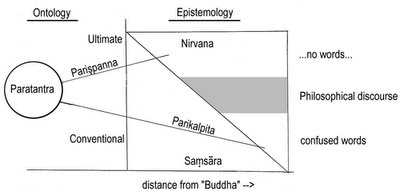Class Two: Resources
Let's see.... Today we talked a bit about reconciling a Buddhist practice or way of life with Western culture; not easy stuff.
I'm really not the best to describe this, either, as I live in kind of my own world of philosophy, which is itself somewhat cut off from contemporary culture. If you have you're own reflections on trying to incorporate Buddhist ideals in life, please hit the 'comment' button and let us know.
One book that I found very interesting was James Coleman's "The New Buddhism: The Western Transformation of an Ancient Tradition". For one that focuses exclusively on Tibetan Buddhism, see Donald Lopez's "Prisoners of Shangri-la: Tibetan Buddhism and the West".

We also discussed this strange chart, ignoring most of the strange terminology, but focusing on the idea that there are two apparently contradictory models of how to move from Samsara to Nirvana. One of those is the 'sudden shift' model found in a lot of Zen and a tiny bit of Tibetan Buddhism (Dzogchen), and the other is the 'gradual path' found in most Tibetan Buddhism and Theravada.
We uncovered my hidden bias for the 'gradual path' model on certain levels as I tried to describe why I think it is better than the 'sudden shift' model. I'll work on that :)
We also discusse the assertion in the Huston Smith book, "The Illustrated World's Religions : A Guide to Our Wisdom Traditions" (which is available for sale at the store) that Buddhism is (let's see if I can remember all seven...)
1. Empirical (based in experience, not blind faith)
2. Scientific (based on laws of cause and effect)
3. Pragmatic (to be used for progress, not clung to dogmatically)
4. Psychological (not metaphysical - focuses on immediate issues, not speculation)
5.
6. Egalitarian (gender equal and anti-caste)
7. Directed toward individuals (based in individual's needs, not just societal structure)
Ok, so 6 out of seven... For my own sketch of what Buddhism is, see here. It goes through many of the same categories and my thoughts on them.
Questions?
Oh.. and next week I'll bring in some of the texts that I have that deal with:
1. Early Mahayana thought (Nagarjuna)
2. Yogacara (practice of yoga school) and their idea of mind-only
3. Buddhism in Tibet
4. Ch'an (China) and Zen (Japan)


3 Comments:
Ontogeny recapitulates phylogeny.
i have noticed that the more i unarttach from outcomes....the better my life becomes. moments of joy arrive in the gaps i create by not judging or attaching any of the silly definitions that others have tried to suggest that i use to describe my reality. how could they know what joy and wonder i experience........unless they ask me? hell, i`m the one experiencing it. how could they know.
*/*
Hi there how are you? I was looking through your blog and found it interesting and wanted to leave you a comment.
I have an invitation for you to come and visit my art blog here in San Diego Southern California. I started this blog in an attempt at finding a creative way to find new friends, and explore my artistic skills through bloging. I have since found many new friends from an international audience. I hope you will stop by and enjoy the various labels and music videos I design for my art blog.
I hope to see you soon :)
Post a Comment
<< Home